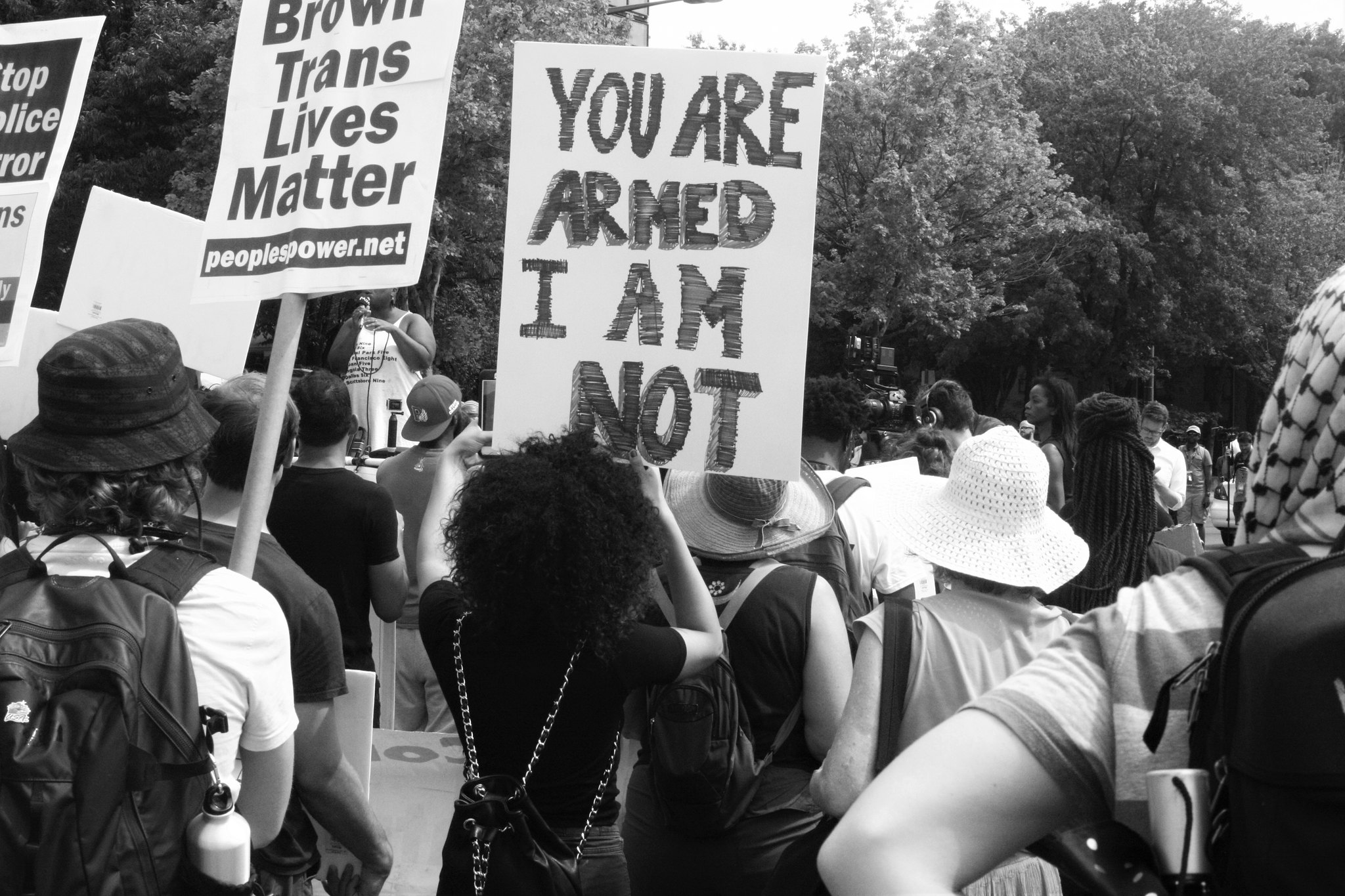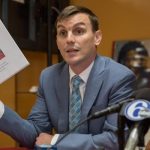All eyes will be on Chicago in August when the Democratic National Convention (DNC) descends on our city. Given Joe Biden’s historic decision to drop out of the presidential race at the eleventh hour, the 2024 DNC will prove to be one of the most consequential political conventions in a generation. It appears that Kamala Harris has enough delegates to be the party’s candidate, but it remains unclear whether there will still be a contested nomination process that will resolve, possibly messily, on the convention floor of Chicago’s United Center. Either way, a successful convention will be critical to the Democratic Party’s hopes to beat Trump in November.
Meanwhile, critics of the criminal legal system concerned with police violence, incarceration, and state repression will be paying just as much attention to what will be going on in the streets outside the convention center and in courtrooms throughout Chicagoland.
Political conventions have long been the target of protests, and the DNC will be no exception this election cycle. The Biden administration faces massive public pressure for its ongoing support of Israel’s destruction in Gaza. Pro-choice activists have watched the eradication of Roe v. Wade and grown apoplectic at how little the Democratic Party has done to protect reproductive rights. Similarly, some LGBTQ advocates have expressed disappointment in what they perceive as the party’s lip service without taking concrete action to improve the material conditions of queer and trans people. Activists will also be mobilizing in Chicago to protest anti-Black racism, poverty, climate destruction, and attacks on immigrants.
For months, organizers have been preparing for actions and demonstrations, while lawyers and legal workers have been working to defend their right to dissent. And preparing for the worst.
Chicago has a long history of political repression, going back to the 1800s, when the Chicago Police Department (CPD) was utilized to quell militant labor organizing. On May 3, 1886, as labor activists fought for the eight-hour workday, Chicago police officers opened fire on striking workers, killing multiple people. The following day, as thousands of workers gathered at Haymarket Square to protest the police violence, a bomb exploded in the crowd. Police again opened fire, killing and wounding dozens of civilians. The bomb-thrower was never identified. Instead, eight anarchist and socialist organizers, mostly immigrants, were arrested and charged with conspiracy. The evidence against them was their roles in organizing the protest, along with their speeches and writings. They were all convicted and four of them were executed.
Chicago police continued to utilize violence to suppress political protest into the 1900s, notably during the Red Summer in 1919, during labor protests throughout the 1930s, and during civil rights actions in the 1960s.
Decarceral thinkers and doers
Every week, Inquest aims to bring you insights from people thinking through and working for a world without mass incarceration.
Sign up for our newsletter for the latest.
Newsletter
The cries of the Haymarket martyrs echoed some eighty years later when the DNC came to Chicago in 1968. The Chicago Police Department again countered protesters with brute force; images of battered and bleeding anti-war protesters were broadcast across the country and throughout the world. Famously, some delegates denounced the police brutality from the convention floor. Following the convention—as if taking a page from the aftermath of the Haymarket bombing—eight radical activists were charged with conspiracy, not for their actions, but for their role as organizers and for the content of their speech.
While the memory of 1968 is at the front of many people’s minds as this year’s DNC approaches, there is unfortunately also a much more recent example of political repression in Chicago. In May 2012 Chicago hosted the NATO summit. While politicians and the media continue to celebrate the police response as a success, those who spent time in the streets and courtrooms during that time have a different memory. On May 20, 2012, after Iraq and Afghanistan veterans threw their medals over the security fence to protest those wars, dozens of people were arrested, many of them beaten with fists and clubs. Throughout the course of the summit and related protests, police arrested over a hundred people, including more than a dozen who were charged with trumped-up felonies.
Most notable was the case of the NATO 3. Three young men, politicized by the Occupy movement, traveled to Chicago to participate in the protests. Unfortunately, they were befriended by undercover CPD officers, who fed them alcohol, recorded their conversations, and entrapped them into making Molotov cocktails, with the active assistance of the undercovers. Then Cook County state’s attorney Anita Alvarez charged the three men with terrorism under Illinois’s state terrorism statute, which had not been previously used. After a weeks-long trial, the three were acquitted by a jury on all terrorism-related charges, but convicted of possession of the Molotovs and each sentenced to years in prison.
In 2020 police again responded to protests with rampant excessive force and mass arrests, this time in response to demonstrations in support of the Black Lives Matter movement. Dozens of lawsuits were filed in response to the police actions, many of which the City of Chicago continues to fight.
It is with this history in mind that activists, advocates, and civil libertarians are preparing for the DNC with caution and concern. The City of Chicago’s actions have done little to calm those fears. CPD’s new mass arrest policy, announced in anticipation of the convention, was criticized for violating the First Amendment. Police reform organizations criticized the policy for allowing police to “kettle” protesters. (Kettling is a practice in which police encircle groups without allowing an opportunity to leave.) The new policy also permits police to use force without documentation. For months, protest organizers have challenged the City of Chicago over permit denials and have had to fight for the right to march at times and locations where delegates could actually see or hear their messages. The city government has enacted a temporary ordinance making it a criminal offense to possess a host of items within the “security footprint” of the convention (covering approximately fifteen blocks around United Center), including selfie sticks, large bags, bicycles, thermoses, and “any other items” which the police superintendent may deem prohibited—which, according to some news sources, will include laptops. Actions like these have led many to believe that the City of Chicago is doing little to correct its historical legacy of political repression.
The anticipated response is particularly complicated in light of Chicago’s current administration. The DNC will be a moment for Chicago’s new mayor, Brandon Johnson, to prove himself on a national stage. Johnson is part of a newer generation of Democrats representing a more progressive wing of the Democratic Party compared to centrists such as Biden and Harris. A former union organizer, Johnson won the mayoral race last year based on a campaign that relied heavily on grassroots support and a stated opposition to some measures favored by police, such as the use of ShotSpotter and having police officers assigned to schools (school resource officers). Many of the people knocking on doors in support of his bid were the same activists and organizers who had taken to the streets in 2020 to protest racist police violence.
Meanwhile, Johnson’s critics in Chicago City Council have fueled a narrative that he is “soft on crime” and the Chicago Fraternal Order of Police (one of the major police unions) has backed efforts to have him recalled. These intracity politics are taking place against a national backdrop where “Chicago” is being used by conservative commentators as a racist dog whistle for street violence and urban blight. Johnson will be under immense pressure to prevent protests from interfering with the convention or disrupting the status quo, for fear of fueling the punditry’s narrative that Chicago is lawless and out of control. And he must balance that against the legitimate fear of alienating his local base by allowing CPD to arrest protesters and subject them to violence indiscriminately.
The convention will be an important political moment for Mayor Johnson. As someone who campaigned on a platform of progress and change, it remains to be seen whether he will have the ability or the political will to curtail CPD’s history of racist criminalization and violence inflicted upon protesters. It remains equally unclear how any of that will be discussed—or leveraged cynically by tough-on-crime politicians—at the national level.
Following the recent assassination attempt on Donald Trump, politicians and talking heads have been quick to condemn “political violence.” Biden addressed the country to insist there was “no place” for any kind of political violence in this country. Yet these voices have remained silent regarding the violence unleashed routinely on political activists in this country. While the Democratic Party will be convening inside the United Center in their effort to beat Trump, many will be watching to see whether those armed with guns, batons, Tasers, and pepper spray inside the “security footprint” will further their long legacy of deploying violence against political dissidents.
Should that happen, it remains to be seen whether anyone from the Democratic Party—including Brandon Johnson, Joe Biden, and presumptive nominee Kamala Harris—will have the courage to speak out against political violence when the perpetrators are wearing badges.
Image: Debra Sweet/Flickr

